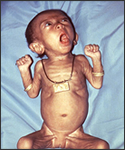Pertussis (Whooping Cough)
Causes Pertussis, a respiratory illness commonly known as whooping cough, is a very contagious disease caused by a type of bacteria called Bordetella pertussis. These bacteria attach to the cilia (tiny, hair-like extensions) that line part of the upper respiratory system. The bacteria release toxins, which damage the cilia and cause inflammation (swelling).
Transmission Pertussis is a very contagious disease only found in humans and is spread from person to person. People with pertussis usually spread the disease by coughing or sneezing while in close contact with others, who then breathe in the pertussis bacteria. Many infants who get pertussis are infected by older siblings, parents or caregivers who might not even know they have the disease (Bisgard, 2004 & Wendelboe, 2007). Symptoms of pertussis usually develop within 7 – 10 days after being exposed, but sometimes not for as long as 6 weeks.
Pertussis vaccines are very effective in protecting you from disease but no vaccine is 100% effective. If pertussis is circulating in the community, there is a chance that a fully vaccinated person, of any age, can catch this very contagious disease. If you have been vaccinated, the infection is usually less severe. If you or your child develops a cold that includes a severe cough or a cough that lasts for a long time, it may be pertussis. The best way to know is to contact your doctor.
Disclaimer: The information contained on the Meningitis Angels web site is not to be considered medical advice or treatment. Consult your health care provider or local health department if you are sick prior and/or prior to the use of any vaccines. Information on this Web site is provided for educational and informational purposes only.
Resource this page www.cdc.gov
Transmission Pertussis is a very contagious disease only found in humans and is spread from person to person. People with pertussis usually spread the disease by coughing or sneezing while in close contact with others, who then breathe in the pertussis bacteria. Many infants who get pertussis are infected by older siblings, parents or caregivers who might not even know they have the disease (Bisgard, 2004 & Wendelboe, 2007). Symptoms of pertussis usually develop within 7 – 10 days after being exposed, but sometimes not for as long as 6 weeks.
Pertussis vaccines are very effective in protecting you from disease but no vaccine is 100% effective. If pertussis is circulating in the community, there is a chance that a fully vaccinated person, of any age, can catch this very contagious disease. If you have been vaccinated, the infection is usually less severe. If you or your child develops a cold that includes a severe cough or a cough that lasts for a long time, it may be pertussis. The best way to know is to contact your doctor.
Disclaimer: The information contained on the Meningitis Angels web site is not to be considered medical advice or treatment. Consult your health care provider or local health department if you are sick prior and/or prior to the use of any vaccines. Information on this Web site is provided for educational and informational purposes only.
Resource this page www.cdc.gov
